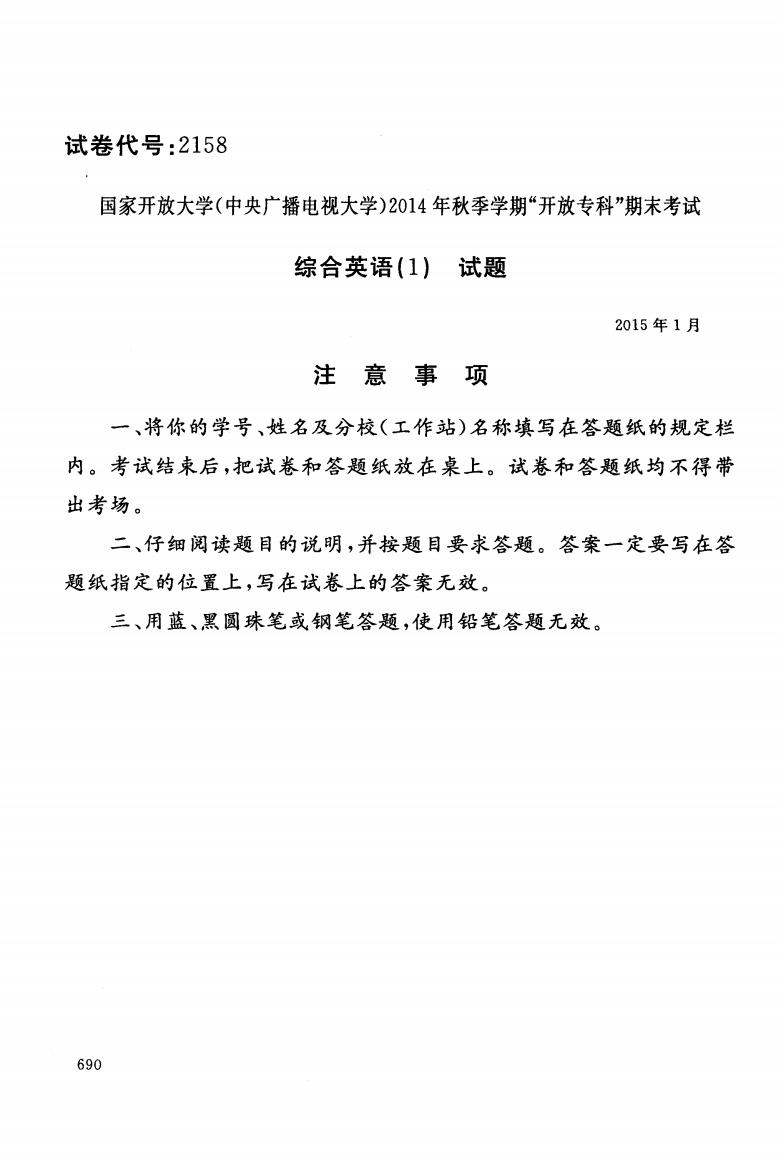
试卷代号:2158 国家开放大学(中央广播电视大学)2014年秋季学期“开放专科”期末考试 综合英语(1)试题 2015年1月 注意事项 一、将你的学号、姓名及分校(工作站)名称填写在答题纸的规定栏 内。考试结束后,把试卷和答题纸放在桌上。试卷和答题纸均不得带 出考场。 二、仔细阅读题目的说明,并按题目要求答题。答案一定要写在答 题纸指定的位置上,写在试卷上的答案无效。 三、用蓝、黑圆珠笔或钢笔答题,使用铅笔答题无效。 690
试卷代号 :2158 国家开放大学(中央广播电视大学)2014 年秋季学期"开放专科"期末考试 综合英语( 1 ) 试题 2015 注意事项 一、将你的学号、姓名及分校(工作站)名称填写在答题纸的规定栏 内。考试结束后,把试卷和答题纸放在桌上。试卷和答题纸均不得带 出考场。 二、仔细阅读题目的说明,并按题目要求答题。答案一定要写在答 题纸指定的位置上,写在试卷上的答案无效。 三、用蓝、黑圆珠笔或钢笔答题,使用铅笔答题无效。 690
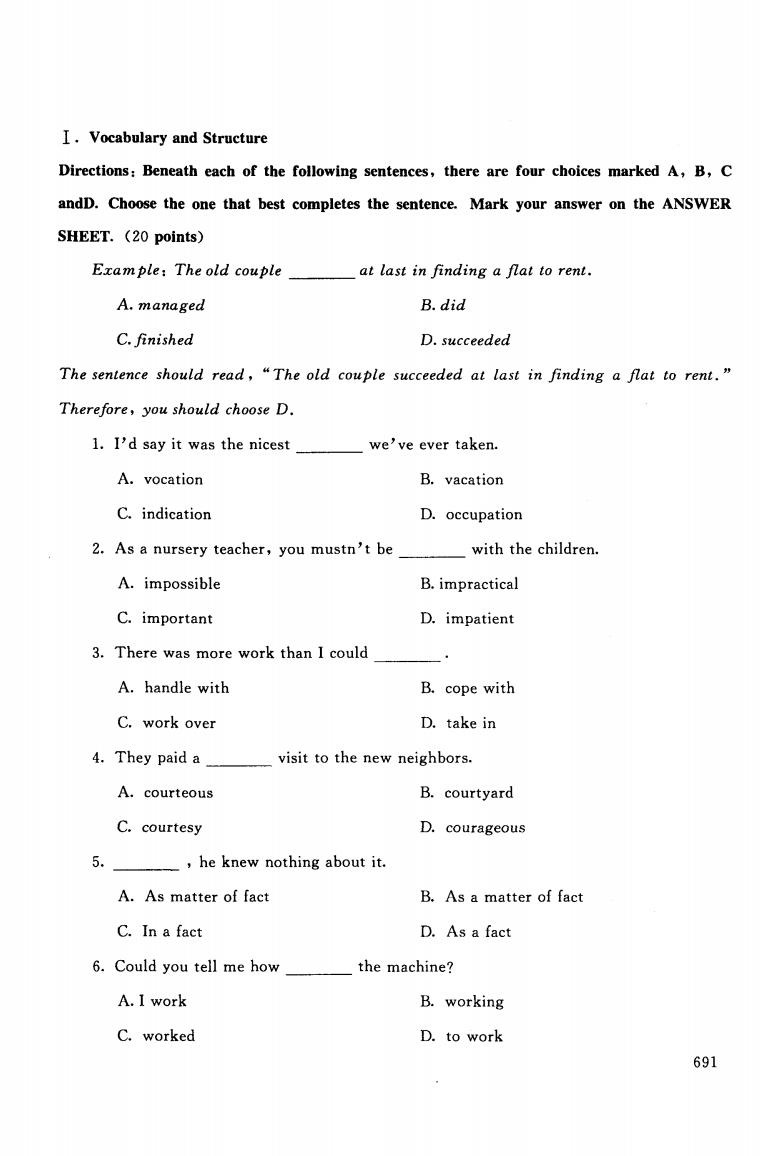
I.Vocabulary and Structure Directions:Beneath each of the following sentences,there are four choices marked A,B,C andD.Choose the one that best completes the sentence.Mark your answer on the ANSWER SHEET.(20 points) Example:The old couple at last in finding a flat to rent. A.managed B.did C.finished D.succeeded The sentence should read,"The old couple succeeded at last in finding a flat to rent." Therefore,you should choose D. 1.I'd say it was the nicest we've ever taken. A.vocation B.vacation C.indication D.occupation 2.As a nursery teacher,you mustn't be with the children. A.impossible B.impractical C.important D.impatient 3.There was more work than I could A.handle with B.cope with C.work over D.take in 4.They paid a visit to the new neighbors. A.courteous B.courtyard C.courtesy D.courageous 5. he knew nothing about it. A.As matter of fact B.As a matter of fact C.In a fact D.As a fact 6.Could you tell me how the machine? A.I work B.working C.worked D.to work 691
1. Vocabulary and Structure Directions: Beneath each of the following sentences, there are four choices marked A, B, C andD. Choωe the one that best completes the sentence. Mark your answer on the ANSWER SHEET. (20 points) Example: The old cou le 一一一 at last in finding a flat to rent. A.man ged C.finished B. did D. succeeded The sentence should read , "The old cou le succeeded at last in finding a flat to rent." Therefore , you should choose D. 1. l' d say it was the nicest A. vocation C. indication we' ve ever taken. B. vacation 2. As a nursery teacher, you mustn' t be 一一一一一 with the children. D. occupation A. impossible C. important 3. There was more work than 1 could A. handle with C. work over B. impractical D. impatient B. cope with D. take in 4. They paid 一一一一一_ visit to the new neighbors. A. courteous C. courtesy 5. 一一一-一, he knew nothing about it. A. As matter of fact C. In a fact 6. Could you tell me how A.I work C. worked CU nbD cc oo uu rr Jmm B. As a matter of fact D. As a fact the machine? B. working D. to work 691

7.Did you have in mind? A.special anything B.nothing special C.anything special D.special nothing 8.I have a car myself,but I to work A.would drive rather not B.would rather not drive C.would rather drive D.not would rather drive 9.-I haven't seen any good movies recently. have I. A.Not B.Either C.So D.Neither 10.-I don't see any aspirin in the medicine cabinet. -It be used up.There is nothing left in the box. A.can B.must C.may D.should II.Situational Dialogues Directions:Choose A,B or C to complete each conversation,using the sentences below.Mark your answer on the ANSWER SHEET.(20 points) Example:-Oh,look.Joni Mitchell is in town. -What?She's one of the greatest folk singers in the world! A.Who's that?I've never heard of her. B.Sure,I'm in town. C.Yes,I'm glad she's coming. Answer A is correct because the conversation should read," -Oh,look.Joni Mitchell is in town. -Who's that?I've never heard of her. What?She's one of the greatest folk singers in the world!" 692
7. Did you have 一『一一一一一.i mind? A. special anything C. anything special 8. 1 have a car myself, but 1 A. would drive rather not C. would rather drive B. nothing special D. special nothing to work. B. would rather not drive D. not would rather drive 9. - 1 haven't seen any good movies recently. A. Not c. So have 1. B. Either D. Neither 10. - 1 don't see any aspirin in the medicine cabinet. -It一一一一一_ be used up. There is nothing left in the box. A. can B. must C. may D. should 1I. Situational Dialogues Directions: Choose A, B or C to complete each conversation , using the sentences below. Mark your answer on the ANSWER SHEET. (20 points) Example: Oh look. loni Mitchell is in town. - What? She' s one of the greatest folk singers in the world! A. Who's that 've never heard of her. B. Sure , l' m in town. C. Yes, l' m glad she' s coming. Answer A is correct because the conversation should read , " Oh look. ] oni Mitchell is in town. Who' s that? I've never heard of her. - What? She' s one of the greatest folk singers in the world!" 692
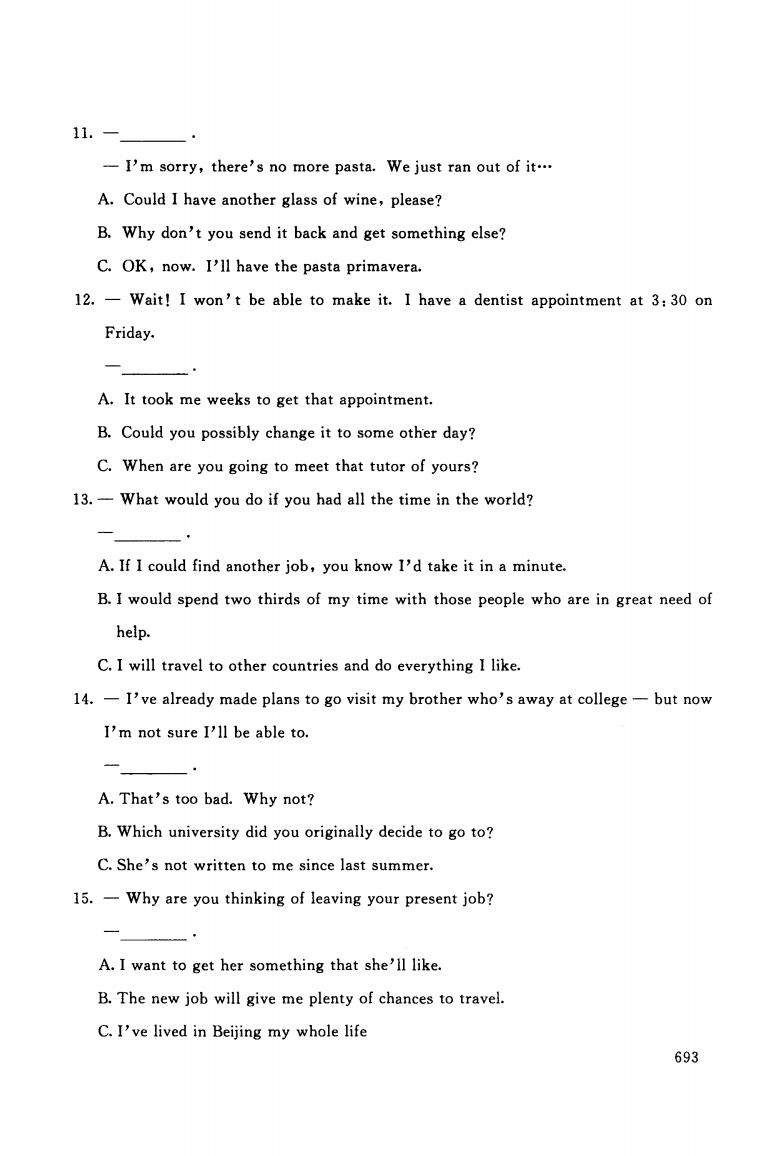
11.- -I'm sorry,there's no more pasta.We just ran out of it... A.Could I have another glass of wine,please? B.Why don't you send it back and get something else? C.OK,now.I'll have the pasta primavera. 12.-Wait!I won't be able to make it.I have a dentist appointment at 3:30 on Friday. A.It took me weeks to get that appointment. B.Could you possibly change it to some other day? C.When are you going to meet that tutor of yours? 13.-What would you do if you had all the time in the world? A.If I could find another job,you know I'd take it in a minute. B.I would spend two thirds of my time with those people who are in great need of help. C.I will travel to other countries and do everything I like. 14.-I've already made plans to go visit my brother who's away at college-but now I'm not sure I'll be able to. A.That's too bad.Why not? B.Which university did you originally decide to go to? C.She's not written to me since last summer. 15.-Why are you thinking of leaving your present job? A.I want to get her something that she'll like. B.The new job will give me plenty of chances to travel. C.I've lived in Beijing my whole life 693
1.一 - I'm sorry, there's no more pasta. We just ran out of it... A. Could 1 have another glass of wine , please? B. Why don't you send it back and get something else? C. OK , now. l' 11 have the pasta primavera. 12. - Wait! 1 won' t be able to make it. 1 have a dentist appointment at 3: 30 on Friday. A. It took me weeks to get that appointment. B. Could you possibly change it to some other day? C. When are you going to meet that tutor of yours? 13. - What would you do if you had a11 the time in the world? A. If 1 could find another job , you know l' d take it in a minute. B. 1 would spend two thirds of my time with those people who are in great need of help. C. 1 will travel to other countries and do everything 1 like. 14. - l' ve already made plans to go visit my brother who' s away at co11ege - but now I'm not sure be able to. A. That' s too bad. Why not? B. Which university did you origina11y decide to go to? C. She' s not written to me since last summer. 15. - Why are you thinking of leaving your present job? A. 1 want to get her something that she' 11 like. B. The new job will give me plenty of chances to travel. C. l' ve lived in Beijing my whole life 693
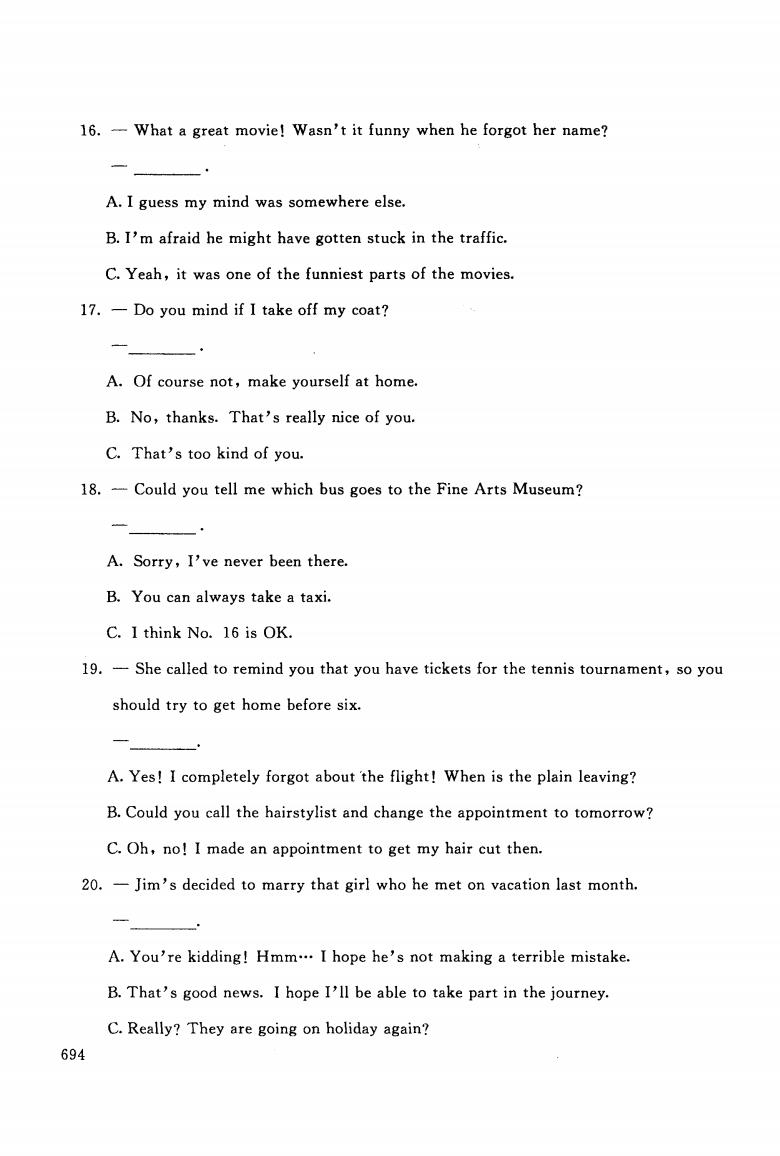
16.-What a great movie!Wasn't it funny when he forgot her name? A.I guess my mind was somewhere else. B.I'm afraid he might have gotten stuck in the traffic. C.Yeah,it was one of the funniest parts of the movies. 17.-Do you mind if I take off my coat? A.Of course not,make yourself at home. B.No,thanks.That's really nice of you. C.That's too kind of you. 18.-Could you tell me which bus goes to the Fine Arts Museum? A.Sorry,I've never been there. B.You can always take a taxi. C.I think No.16 is OK. 19.-She called to remind you that you have tickets for the tennis tournament,so you should try to get home before six. A.Yes!I completely forgot about the flight!When is the plain leaving? B.Could you call the hairstylist and change the appointment to tomorrow? C.Oh,no!I made an appointment to get my hair cut then. 20.-Jim's decided to marry that girl who he met on vacation last month. A.You're kidding!Hmm...I hope he's not making a terrible mistake. B.That's good news.I hope I'll be able to take part in the journey. C.Really?They are going on holiday again? 694
16. - What a great movie! Wasn't it funny when he forgot her name? A. 1 guess my mind was somewhere else. B. l' m afraid he might have gotten stuck in the traffic. c. Yeah , it was one of the funniest parts of the movies. 17. Do you mind if 1 take off my coat? A. Of course not , make yourself at home. B. No , thanks. That's really nice of you. c. That' s too kind of you. 18. Could you te11 me which bus goes to the Fine Arts Museum? A. Sorry , l' ve never been there. B. You can always take a taxi. C. 1 thìnk No. 16 ìs OK. 19. - She ca11ed to remìnd you that you have tickets for the tennìs tournament , so you should try to get home before six. A. Yes! 1 completely forgot about 'the flight! When is the plain leaving? B. Could you ca11 the hairstylìst and change the appointment to tomorrow? C. Oh , no! 1 made an appointment to get my hair cut then. 20. - Jim' s decided to marry that girl who he met on vacation last month. A. You're kidding! Hmm... 1 hope he's not making a terrible mistake. B. That' s good news. 1 hope l' 11 be able to take part in the journey. C. Really? They are going on holiday again? 694

lⅢ.Close lest Directions:For each numbered blank in the following passage,there are four choices marked A, B,C andD.Choose the best one and mark your answer on the ANSWER SHEET.(20 points) The manager of a small building company was very 21 to get a bill for two white mice which one of his workmen had bought.He sent for the workman and asked him why he hadhad the bill 22 to the company. “Well,”the workman answered,“you remember the house we were23-in Newbridge last week,don't you?One of the things we had to do there was to put in some new electric wiring.Well,in one place we had to pass some wires through a pipe 24 and about an inch across,which was built into solid stone and had four big bends in it. 25 could think how to do this unless I had a good idea.I went to a shop and bought two white mice,one of them male and the other female.Then I tied a thread to the body of the male mouse and put him into the pipe at one end,26 Bill held the female mouse at the other end and pressed her gently to make her squeak.When the male mouse heard the female mouse's squeaks,he rushed along the pipe to help her.I suppose he was a gentleman 27 he was only a mouse.Anyway,as he ran through the pipe,he 28 the thread behind him.It was then quite easy for us to tie one end of the thread to the electric wires and pull them 29 the pipe." The manager 30 the bill for the white mice. 21.A.surprised B.sorry C.strange D.fearful 22.A.to be sent B.to sent C.send D.sent 23.A.mending B.cleaning C.repairing D.setting 24.A.thirty-feet-long B.thirty foots long C.thirty feet long D.thirty feets long 25.A.None of us B.No one us C.No of us D.None us 26.A.as B.so C.while D.when 27.A.even though B.as though C.in fact D.sure enough 28.A.pulled B.pushed C.lifted D.brought 29.A.along B.through C.inside D.towards 30.A.received B.agreed C.paid D.cashed 695
lll. \;IOse leSI Directions: For each numbered blank in the following passage , there are four choices marked A, B, C andD. Choose the best one and mark your answer on the ANSWER SHEET. (20 points) The manager of a small building company was very 21 to get a bill for two white mice which one of his workmen had bought. He sent for the workman and asked him why he had had the bill 22 to the company. "Well," the workman answered , "you remember the house we were /23 • 1n / Newbridge last week , don't you? One of the things we had to do there was to put in some new electric wiring. Well , in one place we had to pass some wires through a pipe 24 and about an inch across, which was built into solid stone and had four big bends (弯角) in it. 25 could think how to do this unless 1 had a good idea. 1 went to a shop and bought two white mice , one of them male and the other female. Then 1 tied a thread to the body of the male mouse and put him into the pipe at one end , 26 Bill held the female mouse at the other end and pressed her gently to make her squeak. When the male mouse heard the female mouse's squeaks, he rushed along the pipe to help her. 1 suppose he was a gentleman 27 he was only a mouse. Anyway , as he ran through the pipe , he 28 the thread behind him. It was then quite easy for us to tie one end of the thread to the electric wires and pull them 29 the pipe. " The manager 30 the bill for the white mice. 21. A. surprised B. sorry C. strange D. fearful 22. A. to be sent B. to sent C. send D. sent 23. A. mending B. cleaning C. repairing D. setting 24. A. thirty-feet-long B. thirty foots long C. thirty feet long D. thirty feets long 25. A. None of us B. No one us C. No of us D. None us 26. A. as B. so C. while D. when 27. A. even though B. as though C. in fact D. sure enough 28. A. pulled B. pushed C. lifted D. brought 29. A. along B. through C. inside D. towards 30. A. received B. agreed C. paid D. cashed 695
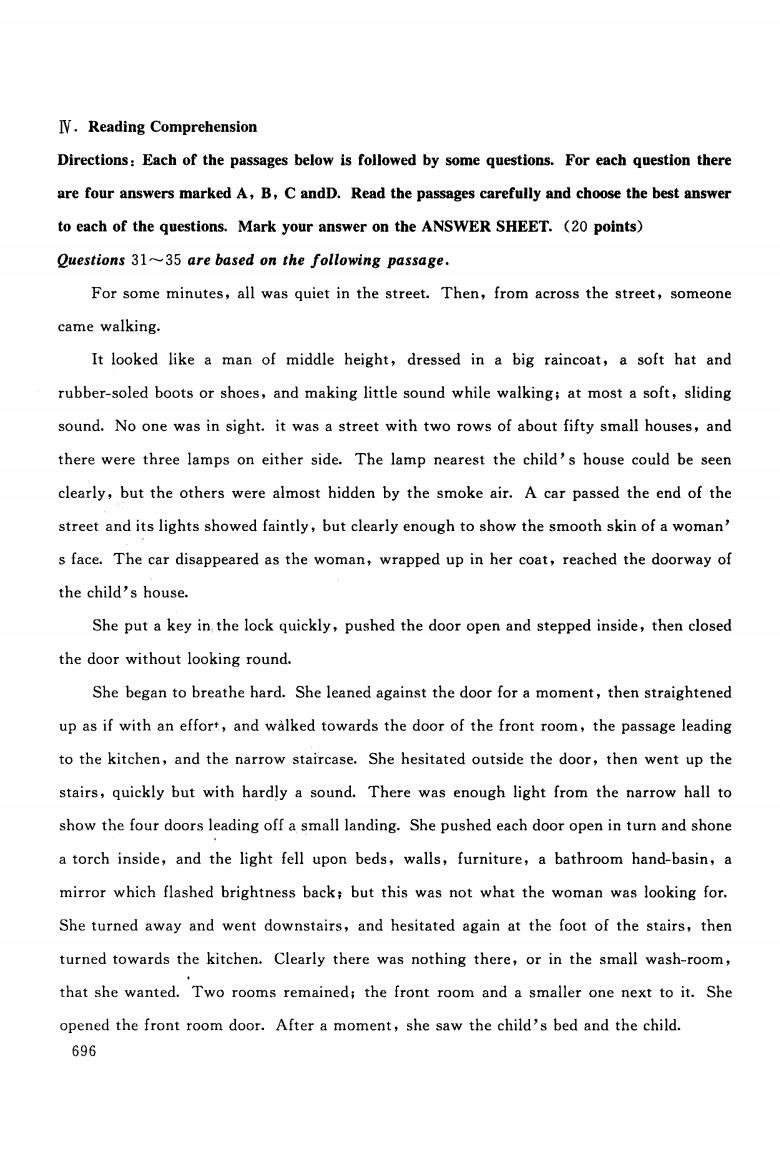
IV.Reading Comprehension Directions:Each of the passages below is followed by some questions.For each question there are four answers marked A,B,C andD.Read the passages carefully and choose the best answer to each of the questions.Mark your answer on the ANSWER SHEET.(20 points) Questions 31~35 are based on the following passage. For some minutes,all was quiet in the street.Then,from across the street,someone came walking. It looked like a man of middle height,dressed in a big raincoat,a soft hat and rubber-soled boots or shoes,and making little sound while walking;at most a soft,sliding sound.No one was in sight.it was a street with two rows of about fifty small houses,and there were three lamps on either side.The lamp nearest the child's house could be seen clearly,but the others were almost hidden by the smoke air.A car passed the end of the street and its lights showed faintly,but clearly enough to show the smooth skin of a woman' s face.The car disappeared as the woman,wrapped up in her coat,reached the doorway of the child's house. She put a key in the lock quickly,pushed the door open and stepped inside,then closed the door without looking round. She began to breathe hard.She leaned against the door for a moment,then straightened up as if with an effort,and walked towards the door of the front room,the passage leading to the kitchen,and the narrow staircase.She hesitated outside the door,then went up the stairs,quickly but with hardly a sound.There was enough light from the narrow hall to show the four doors leading off a small landing.She pushed each door open in turn and shone a torch inside,and the light fell upon beds,walls,furniture,a bathroom hand-basin,a mirror which flashed brightness back;but this was not what the woman was looking for. She turned away and went downstairs,and hesitated again at the foot of the stairs,then turned towards the kitchen.Clearly there was nothing there,or in the small wash-room, that she wanted.Two rooms remained;the front room and a smaller one next to it.She opened the front room door.After a moment,she saw the child's bed and the child. 696
N. Reading Comprehension Directions: Each of the passages below is followed by some questions. For each question there are four answers marked A, B, C andD. Read the pass略目 carefully and choose the best answer to each of the questions. Mark your answer on the ANSWER SHEET. (20 points) Questions 31~35 are based on the following passage. For some minutes, all was quiet in the street. Then , from across the street , someone came walking. It looked like a man of middle height , dressed in a big raincoat , a soft hat and rubber-soled boots or shoes, and making little sound while walking; at most a soft , sliding sound. No one was in sight. it was a street with two rows of about fifty small houses, and there were three lamps on either side. The lamp nearest the child' s house could be seen clearly , but the others were almost hidden by the smoke air. A car passed the end of the street and its lights showed faintly , but clearly enough to show the smooth skin of a woman' s face. The car disappeared as the woman , wrapped up in her coat , reached the doorway of the child' s house. She put a key in. the lock quickly , pushed the door open and stepped inside , then closed the door without looking round. She began to breathe hard. She leaned against the door for a moment , then straightened up as if with an effort , and wàlked towards the door of the front room , the passage leading to the kitchen , and the narrow staircase. She hesitated outside the door , then went up the stairs, quickly but with hardly a sound. There was enough light from the narrow hall to show the four doors leading off a smalllanding. She pushed each door open in turn and shone a torch inside , and the light fell upon beds, walls, furniture , a bathroom hand-basin , a mirror which f!ashed brightness back; but this was not what the woman was looking for. She turned away and went downstairs, and hesitated again at the foot of the stairs, then turned towards the kitchen. Clearly there was nothing there , or in the small wash-room , that she wanted. Two rooms remained; the front room and a smaller one next to it. She opened the front room door. After a moment , she saw the child' s bed and the child. 696
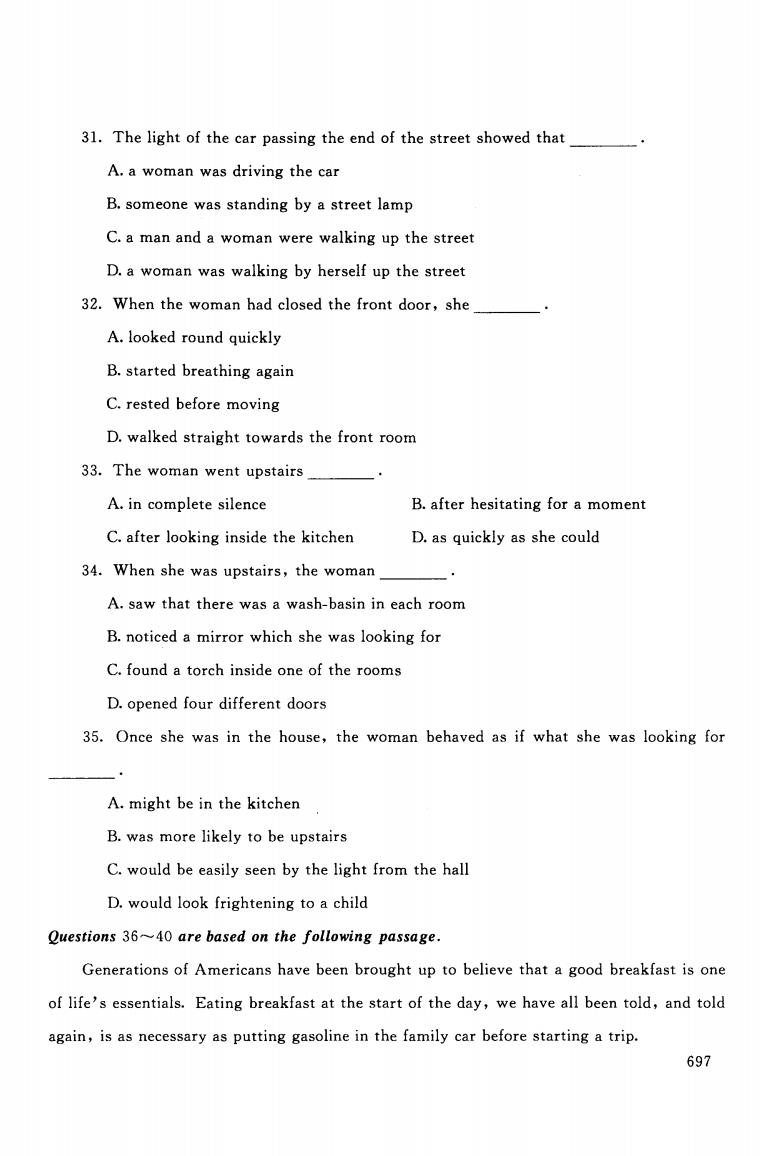
31.The light of the car passing the end of the street showed that A.a woman was driving the car B.someone was standing by a street lamp C.a man and a woman were walking up the street D.a woman was walking by herself up the street 32.When the woman had closed the front door,she A.looked round quickly B.started breathing again C.rested before moving D.walked straight towards the front room 33.The woman went upstairs A.in complete silence B.after hesitating for a moment C.after looking inside the kitchen D.as quickly as she could 34.When she was upstairs,the woman A.saw that there was a wash-basin in each room B.noticed a mirror which she was looking for C.found a torch inside one of the rooms D.opened four different doors 35.Once she was in the house,the woman behaved as if what she was looking for A.might be in the kitchen B.was more likely to be upstairs C.would be easily seen by the light from the hall D.would look frightening to a child Questions 36~40 are based on the following passage. Generations of Americans have been brought up to believe that a good breakfast is one of life's essentials.Eating breakfast at the start of the day,we have all been told,and told again,is as necessary as putting gasoline in the family car before starting a trip. 697
31. The light of the car passing the end of the street showed that 一一一一一一· A. a woman was driving the car B. someone was standing by a street lamp C. a man and a woman were walking up the street D. a woman was walking by herself up the street 32. When the woman had closed the front door, she A. looked round quickly B. started breathing again C. rested before moving D. walked straight towards the front room 33. The woman went upstairs 一一一一一· A. in complete silence C. after looking inside the kitchen B. after hesitating for a moment D. as quickly as she could 34. When she was upstairs, the woman 一一一一 A. saw that there was a wash-basin in each room B. noticed a mirror which she was looking for C. found a torch inside one of the rooms D. opened four different doors 35. Once she was in the house , the woman behaved as if what she was looking for A. might be in the kitchen B. was more likely to be upstairs C. would be easily seen by the light from the hall D. would look frightening to a child Questions 36~40 are based on the following passage. Generations of Americans have been brought up to believe that a good breakfast is one of life' s essentials. Eating breakfast at the start of the day , we have all been told , and told again , is as necessary as putting gasoline in the family car before starting a trip. 697
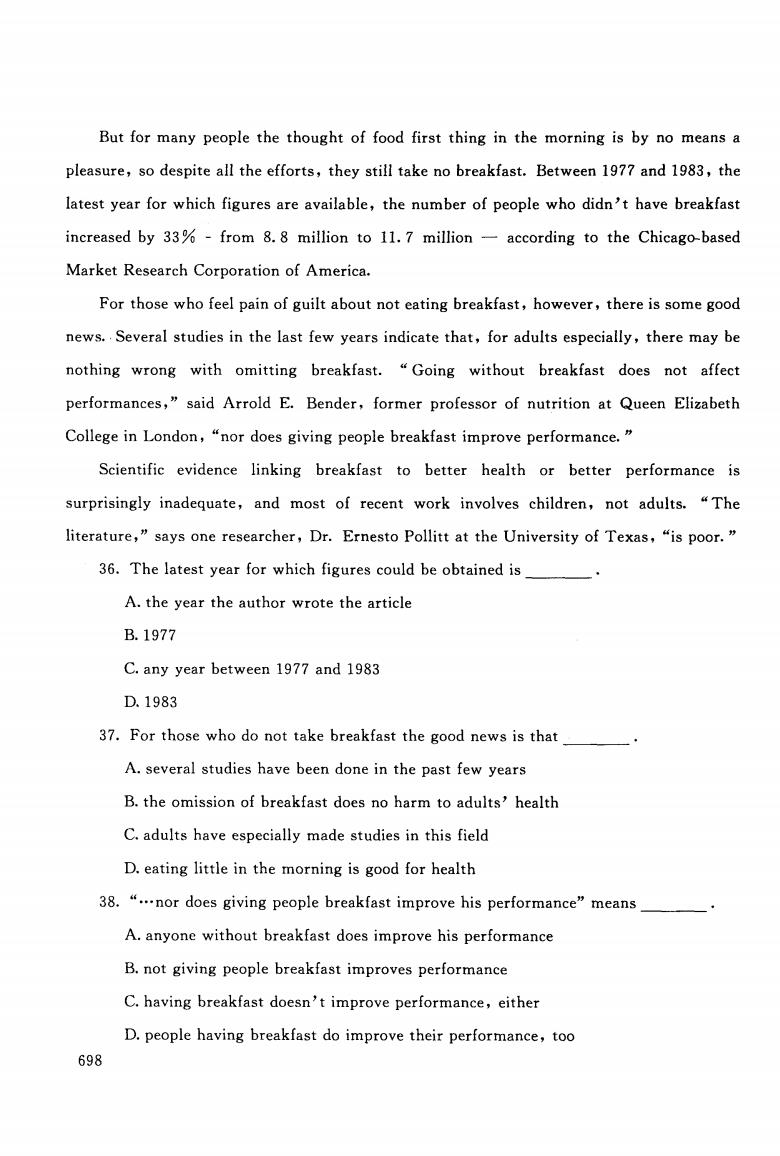
But for many people the thought of food first thing in the morning is by no means a pleasure,so despite all the efforts,they still take no breakfast.Between 1977 and 1983,the latest year for which figures are available,the number of people who didn't have breakfast increased by 33%-from 8.8 million to 11.7 million -according to the Chicago-based Market Research Corporation of America. For those who feel pain of guilt about not eating breakfast,however,there is some good news.Several studies in the last few years indicate that,for adults especially,there may be nothing wrong with omitting breakfast."Going without breakfast does not affect performances,said Arrold E.Bender,former professor of nutrition at Queen Elizabeth College in London,"nor does giving people breakfast improve performance." Scientific evidence linking breakfast to better health or better performance is surprisingly inadequate,and most of recent work involves children,not adults."The literature,"says one researcher,Dr.Ernesto Pollitt at the University of Texas,"is poor. 36.The latest year for which figures could be obtained is A.the year the author wrote the article B.1977 C.any year between 1977 and 1983 D.1983 37.For those who do not take breakfast the good news is that A.several studies have been done in the past few years B.the omission of breakfast does no harm to adults'health C.adults have especially made studies in this field D.eating little in the morning is good for health 38."...nor does giving people breakfast improve his performance"means A.anyone without breakfast does improve his performance B.not giving people breakfast improves performance C.having breakfast doesn't improve performance,either D.people having breakfast do improve their performance,too 698
But for many people the thought of food first thing in the morning is by no means a pleasure , so despite all the efforts, they still take no breakfast. Between 1977 and 1983 , the latest year for which figures are available , the number of people who didn't have breakfast increased by 33 % - from 8. 8 million to 11. 7 million - according to the Chicagφbased Market Research Corporation of America. For those who feel pain of guilt about not eating breakfast , however, there is some good news. . Several studies in the last few years índícate that , for adults especíally , there may be nothing wrong wíth omitting breakfast. "Going without breakfast does not affect performances," said Arrold E. Bender, former professor of nutritíon at Queen Elizaheth College in London , "nor does giving people breakfast improve performance. " Scientific evidence linking breakfast to better health or better performance ís surprisingly inadequate , and most of recent work involves children , not adults. "The líterature ," says one researcher, Dr. Ernesto Pollitt at the University of Texas, "is poor." 36. The latest year for which figures could be obtained is _一一一一一· A. the year the author wrote the article B. 1977 C. any year between 1977 and 1983 D. 1983 37. For those who do not take breakfast the good news is that 一一一一一一· A. several studies have been done in the past few years B. the omission of breakfast does no harm to adults' health C. adults have especially made studies in this field D. eating little in the morning is good for health 38. "…nor does giving people breakfast improve his performance" means A. anyone without breakfast does improve his performance B. not giving people breakfast improves performance C. having breakfast doesn' t improve performance , either D. people having breakfast do improve their performance , too 698

39.The word "literature"in the last sentence refers to A.stories,poems,plays,etc. B.written works on a particular subject C.any printed material D.the modern literature of America 40.What is implied but NOT STATED by the author is that A.breakfast does not affect performance B.Dr.Pollitt is engaged in research work at an institution of higher learning C.not eating breakfast might affect the health of children D.Professor Bender once taught college courses in nutrition in London V.Translation Directions:Put each of the following sentences into English or Chinese,using the word(s)given in the bracket if any.Write your answer on the ANSWER SHEET.(20 points) 41.Graphologists believe that you can learn a lot about people's personalities by looking at the way they write. 42.If you have to touch a person with a cold or handle something that the person has used,wash your hands immediately afterwards. 43.If the weather is cold,I put on some warm clothes and go for long walks on the shore with my dog. 44.最有希望的建议是首先解决那些造成人们无家可归的(根本)问题。(attack) 45.如果晚餐是非正式的,可以问一下你是否可以带点什么,比如喝的或者甜点什么的。 (bring) 699
39. The word "literature" in the 1ast sentence refers to A. stories, poems, p1ays, etc. C. any printed materia1 B. written works on a particu1ar subject D. the modern literature of America 40. What is implied but NOT ST ATED by the author is that A. breakfast does not affect performance B. Dr. Pollitt is engaged in research work at an institution of higher 1earning C. not eating breakfast might affect the hea1th of chi1dren D. Professor Bender once taught college courses in nutrition in London V. Translation Directions: Put each of the following sentences into English or Chinese , using the word(s) given in the bracket if any. Write your answer on the ANSWER SHEET. (20 points) 41. Grapho1ogists believe that you can 1earn a 10t about peop1e' s personalities by 100king at the way they write. 42. If you have to touch a person with a co1d or hand1e som thing that the person has used , wash your hands immediate1y afterwards. 43. If the weather is co1d , 1 put on some warm clothes and go for 10ng wa1ks on the shore with my dog. 44. 最有希望的建议是首先解决那些造成人们无家可归的(根本)问题。 (attack) 45. 如果晚餐是非正式的,可以问一下你是否可以带点什么,比如喝的或者甜点什么的。 (bring) 699